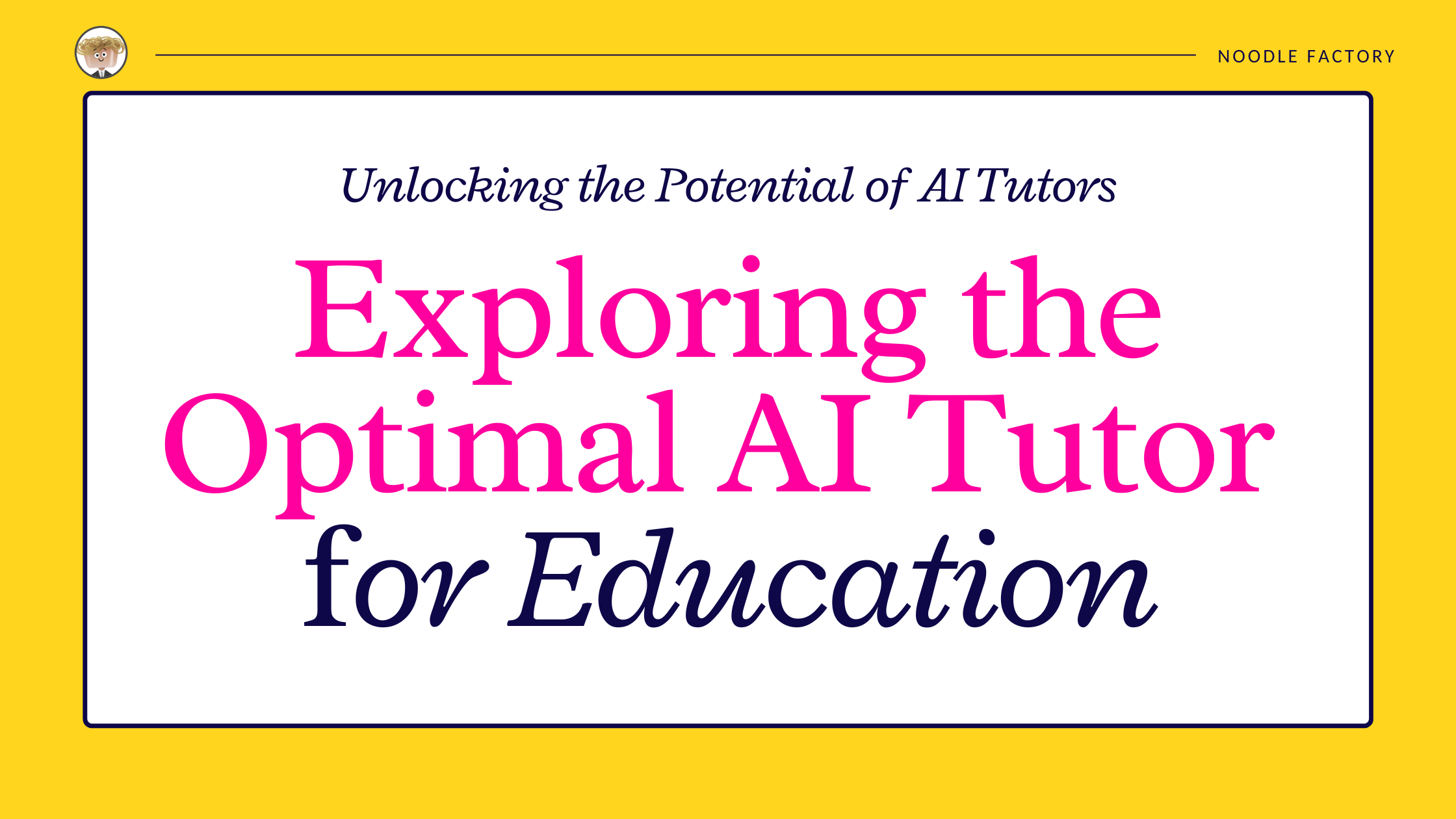In recent months, the use of artificial intelligence (AI) in education has become increasingly popular. With AI-powered tutors, students can receive personalised learning experiences, and teachers can focus on more individualised instruction. However, not all AI tutors are created equal, and an optimal AI tutor for education should possess certain key characteristics to be effective.
Personalisation and Adaptability
One of the key advantages of AI tutors is their ability to personalise instruction based on individual student needs. The optimal AI tutor should possess advanced algorithms capable of assessing each student's strengths, weaknesses, and learning style. By gathering data on students' performance, preferences, and progress, the AI tutor can dynamically adapt the curriculum and learning materials to optimise engagement and understanding.
Natural Language Processing and Contextual Understanding
Effective communication is vital for a tutor-student relationship. An optimal AI tutor should possess robust natural language processing capabilities, allowing it to understand and respond to students' queries and concerns in a natural and human-like manner. This includes the ability to grasp the context and nuances of language, facilitating a more interactive and engaging learning experience.
Comprehensive Subject Knowledge
To be an effective tutor, AI systems need to possess a deep understanding of the subjects they are teaching. They should be equipped with vast repositories of accurate and up-to-date information to ensure the delivery of accurate content that is based on your school's curriculum. The AI tutor should be capable of generating explanations, examples, and demonstrations that are clear, concise, and accessible to learners of varying abilities.
Adaptive Assessment and Feedback
A fundamental aspect of effective learning is continuous assessment and timely feedback. An optimal AI tutor should provide ongoing assessments that adapt to the learner's progress, ensuring that concepts are mastered before moving on. The tutor should offer constructive feedback, highlighting areas for improvement and suggesting tailored resources to address knowledge gaps. By promoting self-reflection and metacognition, the AI tutor empowers students to take an active role in their learning journey.
Multimodal Learning Experience
To cater to diverse learning styles and preferences, the AI tutor should provide a multimodal learning experience. It should incorporate a variety of mediums such as text, images, videos, and interactive simulations to enhance comprehension and retention. By engaging multiple senses, the AI tutor creates a rich and immersive learning environment that fosters deeper understanding.
Ethical Considerations and Emotional Intelligence
AI tutors must adhere to strict ethical guidelines, respecting student privacy and data security. Additionally, you can train your AI tutor to possess emotional intelligence, recognising and responding to students' emotions through text and providing empathetic support when needed. By fostering a positive and supportive learning environment, the AI tutor can enhance motivation, confidence, and overall well-being.
Continuous Improvement and Scalability
The field of education is constantly evolving, and an AI tutor should reflect this by continually improving its capabilities. The optimal AI tutor should employ relevant machine learning technologies, leveraging data from a wide range of students to refine and enhance its instructional strategies. Furthermore, the system should be scalable, capable of accommodating a large number of students simultaneously without compromising the quality of the learning experience.
Integration with Learning Management Systems (LMS) and Other Educational Tools
Finally, an optimal AI tutor for education should be able to integrate with existing education systems. This means that the AI tutor should be able to seamlessly integrate with learning management systems and provide data to teachers and administrators. By integrating with existing systems, AI tutors can be used as a complementary tool to traditional instruction, rather than a replacement.
Conclusion
By leveraging the power of AI, we can unlock the full potential of each learner, ensuring that education is accessible, engaging, and impactful for all.
As AI technology continues to evolve, we must ensure that it is harnessed in a way that promotes equity and inclusivity, and that it supports, rather than replaces, traditional instruction. By embracing AI tutors as a complementary tool, we can create a more dynamic, responsive, and effective learning ecosystem for learners of all ages and backgrounds.
Thanks for reading! As an educator, you know the importance of providing personalised and effective learning experiences for your students. By leveraging the power of AI, you can take your teaching to the next level and unlock the full potential of each learner.
If you're ready to experience an optimal AI tutor, check out Noodle Factory's award-winning AI-powered teaching assistant, Walter. With its advanced algorithms, natural language processing, and comprehensive subject knowledge, Walter has been revolutionising education and empowering educators like you to create more engaging and impactful learning experiences for their students.
Sign up for a one-month free trial and see the difference for yourself. And if you found this post helpful, please share it with your fellow educators!
